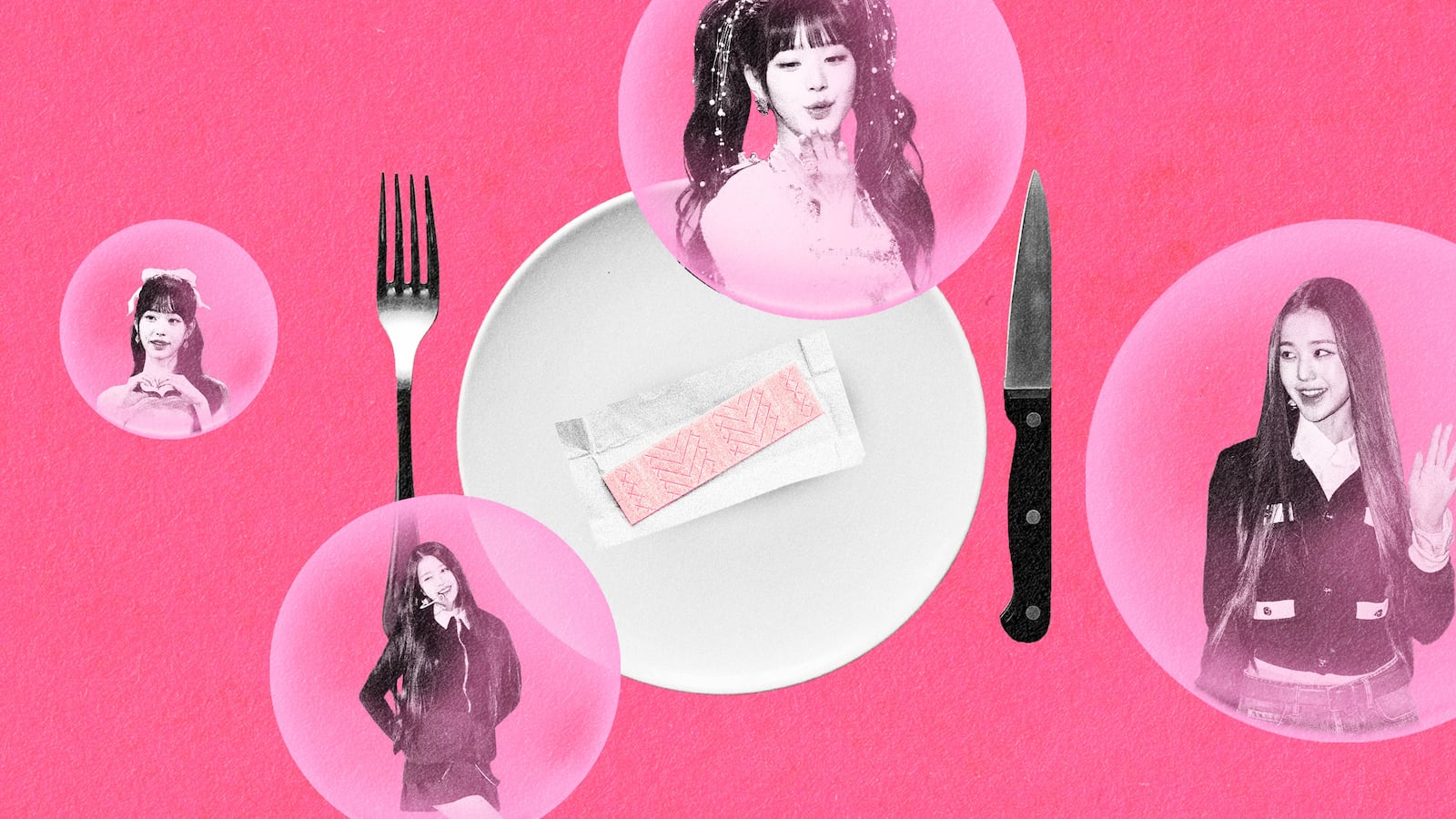Pastel pink and soft vignette filters, images featuring thin girls with long eyelashes, and good grades and skin-care products: These are all manifestations in the world of “Wonyoungism,” a wellness trend growing rapidly online among K-pop fans that, amidst the milky images of bows and strawberries, has faced criticism for promoting eating disorders.
The term Wonyoungism itself derives from the K-pop idol Jang Won-young, a member of the girl group IVE. At 19 years old, Jang has more than 11 million followers on Instagram, and has become something of a platonic ideal for fans online. Jang is confident, smart, pretty, sophisticated, according to those following her; so much so that she has evolved past typical celebrity into a quasi-religious figure, known simply as “Wonyoung.” Using phrases like “The Wonyoung Effect” and “Wonyoung Motivation,” evangelical fans online promote a message of self-improvement centered around the singer, telling one another that by making specific lifestyle changes, they can look and, more importantly, feel as seemingly confident as Jang.
The trend’s first boom happened last year, after an audio clip from an interview with Jang went viral. “I don’t care—you are you, I am me,” she says, a message that drives home two key tenets of the lifestyle: confidence and effortlessness. Inspired by the clip, the hashtag #wonyoungism bloomed among the fandom soon after; now, it currently has over 292,300 posts on TikTok, and many users post in the comments about how following the singer’s maxim—and the ways developed by fans to embody it—has changed their lives.
“No but the glow up every ‘wonyoungism’ girlies had needs to be studied,” one comment reads. “SO TRUE LIKE EVER SINCE I FOUND WONYOUNGISM MY LIFE HAS SM BETTER I'VE GOTTEN SM PRETTIER HOW????” another replied.
The goals of Wonyoungism center around one’s appearance, whether it be physical beauty (with Jang as a benchmark), level of organization and productivity, an outward-facing confidence, or making waking up at 5 a.m. and looking perfect under fluorescent lighting look easy.
The aesthetic is a defining factor of what constitutes Wonyoungism. Everything is frilly, saccharine, and pink—not unlike the coquette trend or “that girl” routines that continue to sweep across social media. Images of long, manicured fingernails on thin, pale fingers, pouty lips, thin women doing pilates, Glossier branded skin-care products, shining sheets of long, dark, hair, and perfect scores on exams dominate the screens of motivational videos and subliminals.
Wonyoungism TikToker Anastasia, 22, who goes by her first name online for security reasons, told The Daily Beast that she first came across Wonyoungism a year ago when the audio of Jang first went viral. “I was very inspired by it, not only by [her] style of clothes, or skin care and makeup, but also by the lifestyle,” Anastasia said. “Within reason, of course.”
While not all Wonyoungism accounts emphasize the presence of food or diet that much, there is an overarching fixation on exercise. Many of the posts solely feature thin women and advertise specific recommendations for weight loss, which can appear to be red flags for unhealthy behaviors masquerading as wellness. While Jang herself hasn’t performed or recommended Wonyoungism’s specific habits—specifically discouraging her underage fans from dieting in a 2021 livestream, calling diets “bad for you”—but has shown some glimpses into her diet and exercise routines in YouTube vlogs that have quickly inspired many copycat videos.
But many of Wonyoungism’s followers still set goals for themselves that are connected to their appearance. Several TikToks hashtagged #wonyoungism show photos of empty plates and chewing gum. In manifestation-style videos with millions of views, followers write their goals in the comments section as though they’re casting proverbial coins into the universe’s fountain: “clear skin, it girl,long hair,pretty nose,smell amazing,good grades,perfect body,great at all sports, my crush likes me back,” one wrote. “i only want good grades,medal and certificates💚since i dont have beauty i'll go with brains,” another said.
@luvely_c0qqu3te Click pause to read ! #fypシ #glowup #wonyoung #wonyoungism #workout #body #dreambody ♬ original sound - ꒰ 𝓳𝓾𝓵𝓲𝓪 ꒱
Any adverse effects are simply categorized by most followers as not a part of the lifestyle. “wonyoungism made me got to hospital,” one user said in the comments. “That wasn’t wonyoungism then,” another responded. Creator run2wony recently disappeared from TikTok after facing backlash for their “harsh motivation” videos that others in the community called out for being mean—but when they did a face reveal, many put down the creator by saying they were “bigger than me.”
Yeshia Otero, 14, runs the Wonyoung fan account @wonwonysii_, where she posts content around her results and recommendations to following Wonyoungism. Otero is a fan of several K-pop girl groups, including NewJeans, Blackpink, and, of course, IVE. She told The Daily Beast that she first found out about the trend when it appeared on her For You Page, and began trying out the lifestyle component after watching a few videos. “It’s kinda hard at first, but if you don’t have motivation and discipline, you’re never gonna make it,” she said. “It’s easy for me, but there are times I lose track.”
Part of those habits include working out, following a skin-care routine, and finding hobbies in her spare time. “I [lost] some weight, got better grades, and it changed my whole appearance,” Otero said. She “got healthier,” too. “I seldom get sick, and my metabolism got fast,” she explained.
Like Otero, many users in Wonyoungism spaces on TikTok and Reddit identify themselves as minors, with some as young as 13. While academic success is another frequent and common goal among people attempting the lifestyle, concerningly, younger users often name weight loss as one of their motivations for following the trend too.
No matter the age, perfection is the name of the game in Wonyoungism. It requires assuming an ideal lifestyle as perceived through the K-pop industry’s rabbit hole of content—which is often curated and manufactured for exhibition, rather than portraying real lives. The industry has long received criticism for placing emphasis on unrealistic beauty standards and failing to be transparent about the reality of being an idol, particularly through online video content that inspires fan theories about what goes on behind the scenes. As a result, some of the discussion among Wonyoungism followers leans toward the obsessive, betraying signs of disordered eating habits and behaviors.
Otero and Anastasia do not consider any of their results as part of an eating disorder. Weight loss, fast metabolism, and “changed” body and facial structure are the terms they use, seen as byproducts of supposedly better health.
But marriage and family therapist Jennifer Whang told The Daily Beast that eating disorders can begin early in childhood, and are often unrecognizable to the child as something dangerous. Warning signs include a compulsion to exercise every day, or stress about food intake.
“In my experience, I’ve seen it as young as 10 or 11 years old, and [they’re] more prevalent with girls in high school,” she said. “My clients in college are more forthcoming about it, but many are not framing it as an eating disorder when they’re exercising excessively. I’ve never heard an adolescent say they have an eating disorder outright, but more like, ‘I think I have a problem with food.’”
Whang said social media plays a huge role in influencing young people’s self-image, and she often sees a link between the rise of an eating disorder and the moment that a person starts using social media. “I hear more of like, ‘I like to work out a lot, so they like to work out every day,’” she said. “I ask if they’re eating enough or drinking enough water, but they’re restrictive on that.”
Much of what Whang describes resembles habits encouraged or exhibited by Wonyoungism. Of course, this is not the first time that mentalities promoting eating disorders have found their way into lifestyle trends on social media. Trends like intermittent fasting, Tumblr-disseminated anorexia, and celebrity diets like the IU Diet have been criticized for encouraging disordered eating, which can be the start of a slippery slope toward a dangerous relationship with food and exercise.
Otero and Anastasia are also aware that eating disorders are a growing issue amongst the wider community of people tagging their videos as Wonyoungism, but say that encouraging eating disorders is not part of their missions. “I think these Wonyoungism accounts that are promoting eating disorders are shameless,” said Otero. “They are promoting things that can cause harm to someone’s life, but yeah, overall, it’s dangerous, and it’s disgusting.”
Anastasia said that it’s less of a problem with the lifestyle tenets overall and more to do with a few bad actors who are taking the whole thing too far. “I am sure that Wonyoung herself would not want her name to be associated with unhealthy practices,” she said. “We should take care of our body and mind. That is the main message of the movement.”
Part of what bolsters the presence of these “bad actors” is that wellness and other types of content often spread without anyone checking if the advice is credible, New York-based psychotherapist Cynthia LaForte told The Daily Beast.
“Anyone with a smartphone has a platform which leads to misinformation and disordered eating being disguised as health advice,” she said. “There is a big difference between a dietitian, someone with a postgraduate degree and a license from the state, and a nutritionist, someone that, in most states, needs no certification or licensing at all.”
In an attempt to subvert the pressure to follow the lifestyle perfectly, some Wonyoungism followers have posted content praising body positivity and diverse foods. Jang herself has also cautioned fans, particularly underage fans, against dieting—although she hasn’t addressed the Wonyoungism movement specifically.
@wonyymotive #WONYOUNG | hope everyone listens to ger advice and takes it to mind 🫶🏼🌷 | video from- @🦢 ♬ original sound - wony🎀
Some Wonyoungism accounts have begun to open up about the harsher realities of the movement. On her TikTok account, Otero made a post last month unveiling some of her insecurities. “Here are 5 things I’m ashamed to admit as a Wonyoungism account,” she captioned the slideshow. She confesses that she is “not 100% confident at all,” she is sometimes “not productive,” and she does get hurt by negative comments.
Other users responded kindly. “ofc it’s alright,ppl aren’t perfect,but as a wonyoungism account,ur rly brave to share all those things. Most ppl wouldn’t,but I believe [in] you!!” one user wrote under the video.
“We often try to obtain beauty standards not because of how our body will look but because of how we think we’ll feel emotionally,” LaForte said on the roots of why eating disorders arise in general. “We see people with so-called perfect bodies and project all the things we want to feel onto them. And we think if we looked like that, we’d feel that way. ‘People will love me more.’ ‘I’ll be happier.’ When in actuality, the road to achieving this is often fraught. Excessive exercise, counting calories, forgoing meals and celebrations with loved ones.”
She instead urges Wonyoungism followers to think about learning to listen and pay attention to their own bodies, which isn’t necessarily an easy task. “In many ways it’s easy to have food rules, count calories and follow a militant workout regime. Just as it’s easy to do the total opposite. Which is why people can get caught in a vicious cycle. The hard part is balancing it all—what feels good from a nutrition perspective and a pleasure perspective as well as when to exercise and when to rest.”







